Sappho is a poet from ancient Greece. For 2,700 years she has attracted readers’ attention, and the first thing to know about her is that her verse still ‘works’, still affects us, while much other verse does not.
The second thing to note is that this response occurs in the absence of almost all her poetry, which has been destroyed over the centuries. We respond to fragments – phrases, metaphors, lines and couplets: there exists only one entire poem and two that seem almost entire.
This is a remarkable achievement, and can probably be said of no other figure in literature.
But because of this strong response we tend to think of Sappho in isolation when in fact she was part of a culture. She worked in a world of other poets, and looking at them can also tell us more of Sappho.
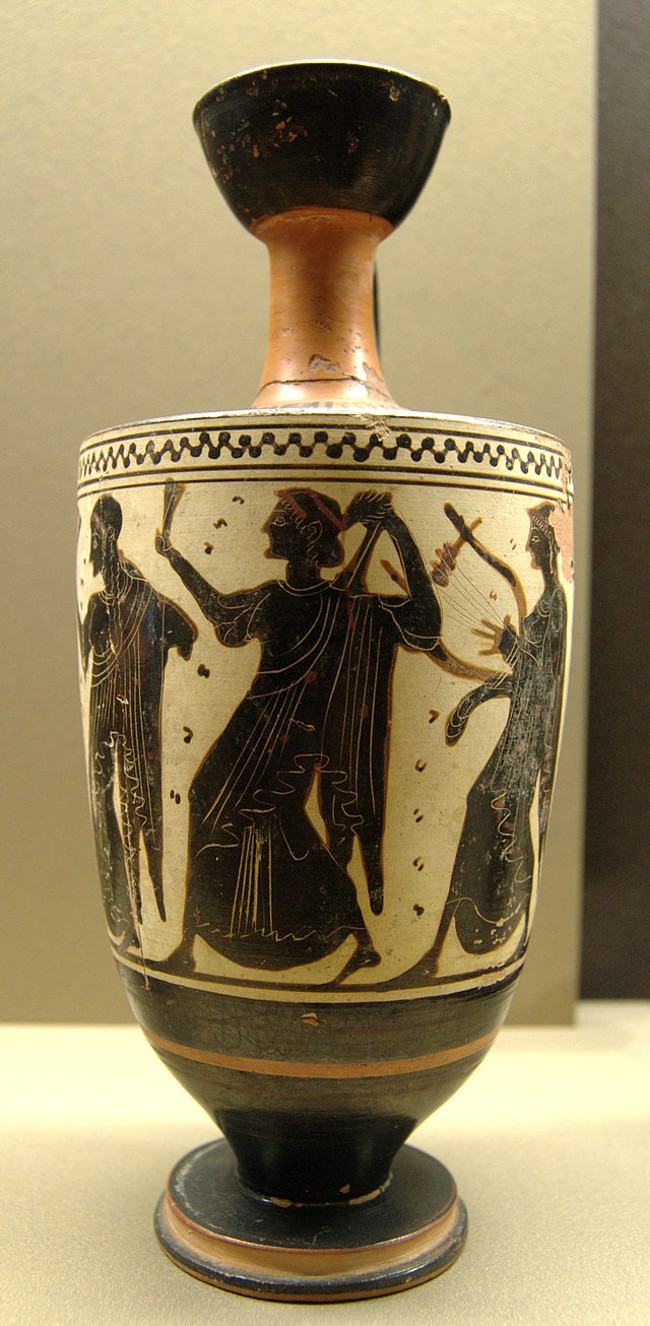
Apollo and the Muses performed in the agora and the theatre
Singers and poets
Before the start of the sixth century BC in Greece what we think of as poetry was performance, by artists who composed music and verse, played an instrument, sang and danced. In other words it was an oral culture.
By the start of the sixth century, towards the end of Sappho’s life, a revolution in culture had taken place. Writing had come from Asia Minor and been adapted by the Greeks, used at first for accounting and tax purposes. It had then been adopted by the travelling bards as an aid to memorising the long songs they performed. Now it entered communities as a new means of communication. The works of the old poets, and then of the new, began to be recorded.
But it also meant the gradual eclipse of the old rhapsode, the travelling bard with his repertoire of remembered song, and of the lyricist, the lyre player who sang their own compositions. As each song came more and more to be just read, the focus now was on the text, and that alone was copied.
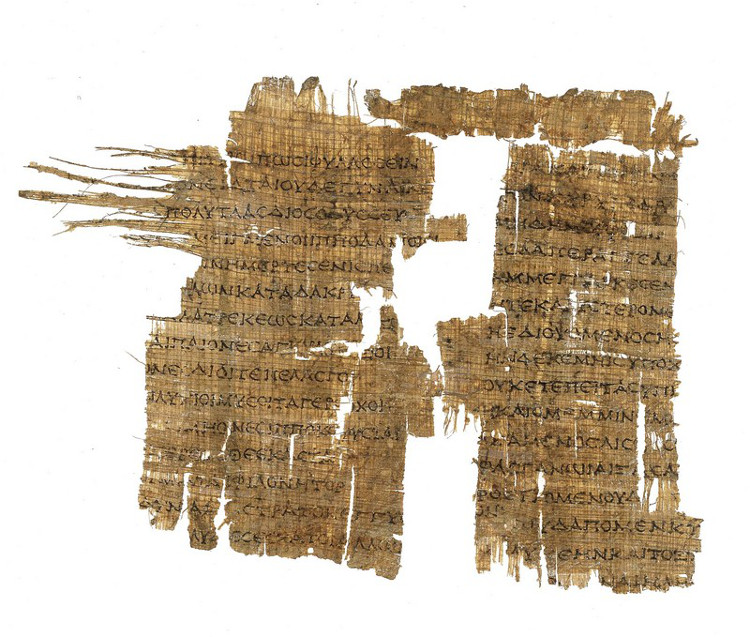
The Iliad, as it came to be written
Precursors
Sappho of Mytilene lived between 630 BC and 570 BC on the island of Lesbos, and from childhood was probably familiar with singers who had been famous since her father’s time. (All dates are conjectural).
Sappho’s older contemporary was the rhapsode (meaning someone who stitched poems together for recitation) Homer. There were most likely many ‘Homers’ since the times when Mycenae led a federation of Greek raiders against Troy in about 1200 BC, but one of them was a genius, who produced, from traditional tales, a majestic work, The Iliad (The War Against Troy or Ilium), and the fascinating story of The Odyssey (The Voyage of Odysseus). The Greeks always thought of these poems as their greatest achievement in poetry.
Homer probably lived in the seventh century BC on Chios, and travelled to the islands and towns of west Asia. Sappho would have grown up listening to these works at festivals and feasts, and met and been impressed with some of the singers.
Terpander of Antissa in Lesbos, about 690 to 630 BC, influenced every poet and singer who came after him, by enriching Greek song with music from west Asia (music from Mesopotamia is known from about 1500 BC). He revised and regulated musical practice in Greece and was a famous performer on the lyre or kithara. Nothing of his songs survives. Sappho would have sung in the way she did because of Terpander’s work. More on the kithara or concert lyre at https://www.youtube.com/watch?v=6adj7Xoo9Us&t=10s
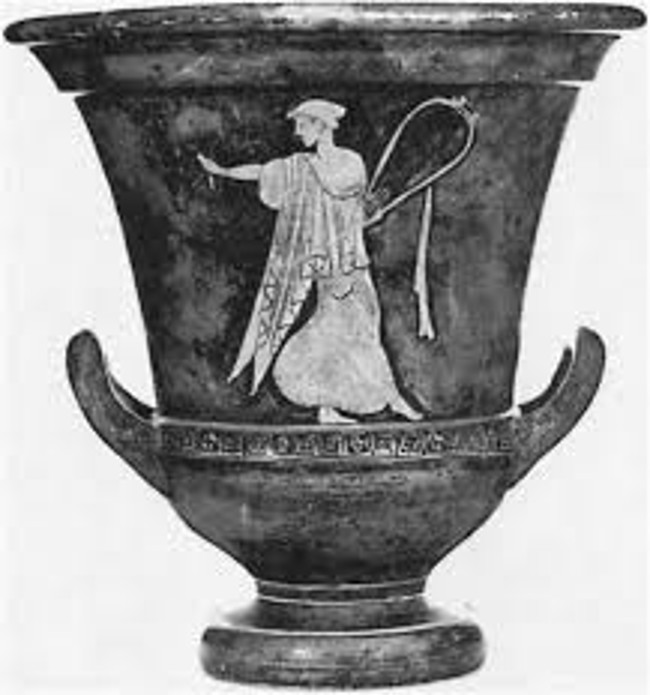
Sappho the singer
Arkhilokhos of Paros, 680 to 645 BC, one of ancient Greece’s most celebrated poets, was probably a contemporary of Homer, and the inventor of lyric poetry in its modern sense, expressing personal emotion. He was a devotee of Demeter (as Sappho was of Aphrodite). He wrote in many forms of contemporary verse, but was famous for the pungency and force of his iambics. Scholars debate if some of his verses are autobiographical, or dramatic, spoken by a character in a story. Nothing of his work survives except fragments. Arkhilokhos seems at times to debunk Homer (there was said to be a genre of mock-epic), and his personal tone probably influenced Sappho, as could his use of a dramatic form.
Semonides of Amorgos lived between 670 and 600 BC. He composed both iambic and elegy. Only fragments of his work survive.
Olympos of Phrygia, 660 to 620 BC, a composer for the flute or aulos, was an innovator for that instrument and introduced music systems from Phrygia to Greece. Olympos’ work would have helped to create the flute accompaniment for her songs. No songs of Olympos have survived.

The aulos or flute
Mimnermos of Smyrna, 650-600, a writer of sad elegies and other forms of verse, was thought the equal of Arkhilokhos by scholars of antiquity, but few examples of his work have survived.
These six poets were all famous in Sappho’s day, and she would have heard their songs. Perhaps they influenced her own work, but we can only speculate. Other seventh century poets seem unlikely to have influenced Sappho, as they worked on mainland Greece in formats she is not known to have often used.
Arion from Lesbos, 690 to 640 BC, became famous for his choral works. He travelled to Corinth and became one of the founders of tragedy there.
Hesiod of Boeotia, 680 to 620 BC, wrote in the Homeric mode, but tackling near Eastern mythology, and agriculture.
Kallinos of Ephesos, 680 to 630 BC, lived in a time of war and invasion by foreign armies, and what little of his poetry that survives deals with these themes.
Tyrtaeos 670 to 610 BC, was a Spartan poet famous for his choral work for festivals.
Alkman of Sardis 670 to 610 BC, lived and worked in Sparta, and was known for his choral work. These were frequently for rites performed by young girls, and some have the erotic content found later in Sappho.
Scholarly sources of information come from Alexandria in the third century BC and also from Constantinople in the medieval period, but it is not clear whether entire scrolls had survived to these times or not.
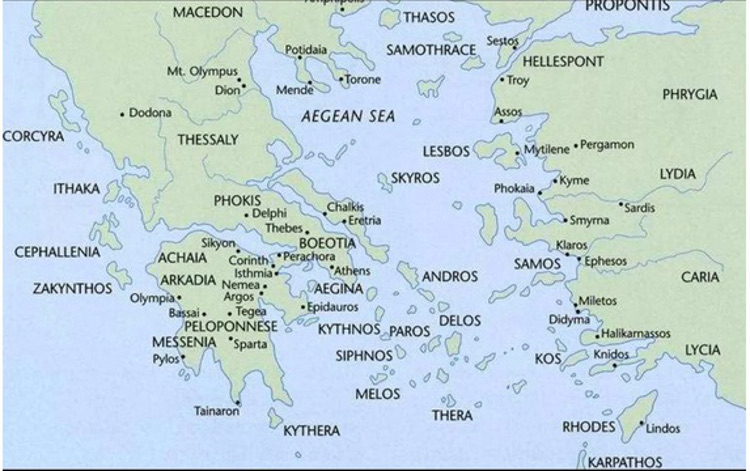
The Greek world in the Aegean
The Hellenes
There was no country called Greece at that time, no countries at all. The Greeks called themselves Hellenes, descendants of a common ancestor, were members of a polis, and recognised other Greeks by language and common culture. Other peoples were tribal, called by the Greeks barbarians (foreigners). Some of these peoples were organised into great multicultural empires.
Conflict was constant, in each polis between classes, and against imperial invasion. There was often better relations between Greeks and barbarians than between Greek aristocrats and commoners. Conflict was often avoided by the founding of colonies throughout the seventh century. Instead of squabbling over the same piece of land, each polis sent out settlers all around the eastern Mediterranean and the south coast of the Black Sea.
Many of the seventh century poets were located in the northern cities of the Turkish coast and adjacent islands (including Lesbos).
Mytilene was involved in a war with Athens to control the Black Sea trade, in which Sappho’s father was killed. A civil war was fought between the aristocratic party and a popular leader, Pittakos, and his followers which resulted in many of the aristocratic party being exiled. Sappho was said to have been exiled to Sicily about 600 BC, married there, and returned to Lesbos with a daughter. Both she and another exiled aristocrat, Alkaios, then devoted themselves to the performance of songs at the many festivals, religious and civic, of Mytilene.
Lesbos gradually lost its preeminence. There was at last nowhere else where Sappho’s work was celebrated and preserved, and that work was rendered difficult to read as well, as Sappho’s dialect became obsolete. Power moved westward, to mainland Greece, Athens and Sparta, and further west still to Sicily, and Syracuse.
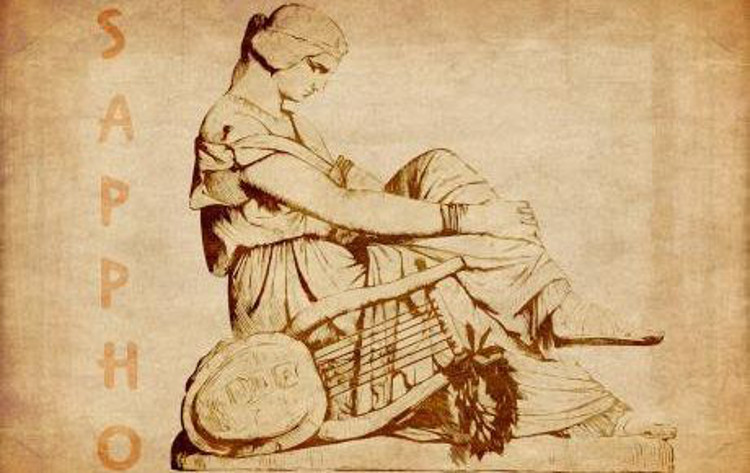
Sappho
Contemporaries
Alkaios, from Mytilene, 620 to 580 BC, was a friend or at least an acquaintance of Sappho. Both were part of the aristocratic faction that opposed the popular leader (tyrant) Pittacos, were exiled, and were ultimately allowed to return and devote themselves to poetry. In the third century scholars at Alexandria were able to collect 10 scrolls of his poetry. This might include poems attributed to Alkaios. He was said to have written in many metres. Only fragments remain of his work. Alkaios and Sappho were said by ancient critics to be the greatest of ancient lyric poets.
Stesichoros of Sicily 630 to 555 BC wrote lyric narratives in Homeric style for both chorus and solo performance. His work was collected in 26 books by the Alexandrian scholars in the 3rd century BC but almost all of it has now vanished.
Solon of Athens 630 to 560 BC was a statesman and reformer whose poems defended and explained his reforms. Only small fragments survive.
Later poets
There were many poets who worked in the period after Sappho. The greatest of these were probably Simonides, Ibycus and Pindar; but there were also Anacreon, Theognis, Hipponax, Bacchyllides, Myrtis and a later group, all female, Erinna, Korinna, Moero, Praxilla and Nossis. All their poems exist only as fragments (except some of Pindar’s odes). Some are translated here: https://canvas.uw.edu/courses/1448584/pages/sapphos-sisters-the-other-women-poets

Aphrodite
Fragments
From https://www.uh.edu/~cldue/texts/sappho.html, translations by Julia Dubnoff. Sappho’s fragments are about marriage, mourning, family, myth, friendship, love, Aphrodite. The most commonly mentioned topic in the fragments is marriage, while the longest poem is a prayer to Aphrodite. More on translation and how to sing Sappho is here http://playingsappho.collegeofwooster.net/project-findings-and-decisions/
33
When you lie dead, no one will remember you
For you have no share in the Muses’ roses.
No, flitting aimlessly about,
You will wildly roam,
a shade amidst the shadowy dead.
16
As a wind in the mountains
assaults an oak,
Love shook my breast.
2
I tell you
someone will remember us
in the future.

Lesbos in May
Like all that survives of Sappho’s poetry, its fragmentary nature makes its meaning ambiguous. Scholars felt and feel she was technically accomplished to a very high degree. But the most that can be said about the poems’ content is that Sappho had a mastery of the use of metaphor, loved and responded to the countryside of her native Lesbos, was probably part of a group dedicated to Aphrodite and was close to others who were perhaps in the same group. I feel she must have been an impressive musician and singer to have been so long remembered in antiquity. And that most of her fragments are more memorable than that which remain of other early poets.
©2022 Original material copyright Phillip Kay. Images and other material courtesy Creative Commons. Please inform post author of any violation.